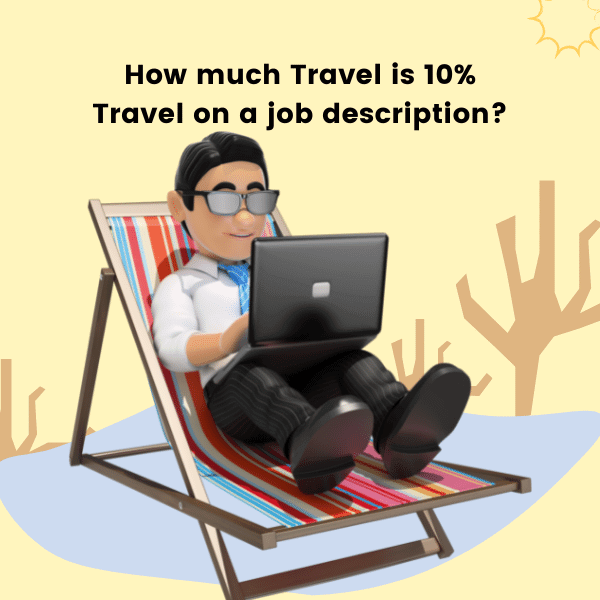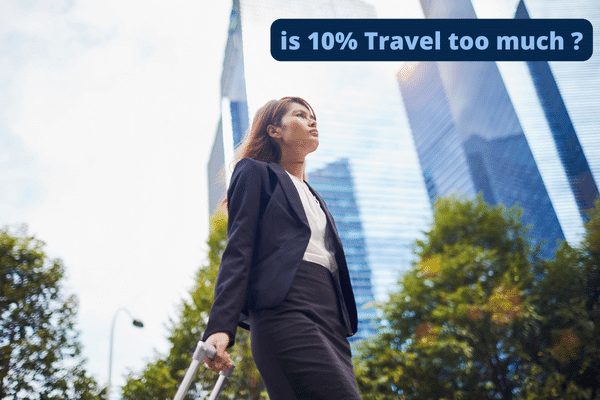You certainly have heard about the 10% Travel or seen it in the job description. What does the 10 percent travel mean, then?
It means that your employer expects you to spend 10 percent of your working days traveling or in cities other than your home city.
10% Travel : How to calculate travel percentage?
- How many days?
But how can one know the exact number of work days they will be spending in other countries or cities away from home?
It is very easy; you only have to do a quick calculation.
For instance, if your employer wants you to be traveling 10 percent of your working days – 260 days yearly on average – then you would expect to leave your office or town for 26 days each year.
- How many weeks?
Therefore, if you happen to work 50 weeks per year and need to go on five business trips per year, each lasting one week (e.g., to visit a client in the context of a project), this accounts for 10%.
- How many hours?
For the most part, let’s assume you work full time. This means that you will work 1,920 hours per year. Travel percentage is a percentage of the total number of hours or days you are willing to spend traveling.
For instance, if your employer requires you to be traveling at least 20% of the time, that would mean up to 384 hours of travel. Put another way, approximately 16 days per year.
You should double-check with your employer to see if this also applies to weekends or not. There is no problem if you tell your employer that you do not want to do any business travel on weekends.

Is 10% travel too much travel?
No Mention Of Drug Tests In A Job Offer : Does that mean no test?
Effects of heavy traveling
Around 30% of working travelers say it is very difficult to stay healthy when they travel for work, and 24% say they are even more likely to get physically ill after a business trip.
Almost half of them don’t sleep enough when they travel for work, based on a new report by business travel management company TravelPerk.
The disruption that business travel causes to routine often leads to unhealthy eating and drinking, as well as a lack of physical activity. In addition, business travel can affect many people’s sleep, which in turn can jeopardize the immune system.
In addition, an estimated 30 percent feel they need to be constantly reachable while traveling for business, and 27 percent have trouble finding time for themselves and relaxing, according to the TravelPerk report.

According to a study last year, those who traveled 14 or more nights per month for work – as compared to those who traveled only one to six nights per month – had a higher body mass index and were more prone to symptoms such as anxiety, depression and alcohol dependence, the Harvard Business Review reported.
Meanwhile, those who traveled 21 or more nights per month for work were significantly more likely to be obese and experience higher blood pressure.
Needless to say, each company has very distinctive approaches and needs, so you should initiate the conversation with your employer.
Can “10% Travel” be considered heavy traveling?
Employers often indicate 10% travel time with almost no intention of actually asking it because it’s only required on an occasional basis.
So many people in these positions do not travel for years. But if an employer is actually considering regular travel, you need to find out what kind of frequency they really look for.
For the majority of workers, there is a world of difference between two one-day trips per month compared to a one-week trip per quarter or a five-week trip per year, all of which could reasonably be considered as 10% of travel time.
In a nutshell, 10 percent is a convenient and unproblematic travel rate for workers, which did not cause them any significant difficulties at work and did not affect them on either a personal or professional level.
Read also: When Is It Too Late To Cancel An Interview?
Is business travel compulsory?
The first labor law question arises even before the business trip begins. Is a business trip part of an employee’s duties at all, can the boss simply order the business trip, or can an employee refuse a business trip?
Particularly when children are involved or one is caring for one’s own parents, the business trip does not exactly cause shouts of joy.
Nevertheless, business trips are usually obligatory and not a free ride for the employee. In many areas, business travel is already part of the job description and is therefore always obligatory because the job can hardly be performed without business travel.
Classic examples of such professional areas that cannot do without business trips are sales, management, or field service.
On the other hand, the number of days for business travel is not strictly defined or precise but depends on the needs of the company. Sometimes employers just want to test your willingness to travel!
[Guide] Should I include therapy on my resume?
Can workers evolve from 10% travel to 50% travel?
The answer to this question is yes, employees love to travel! Some certainly prefer jobs that give them routine and allow them to always be near family and friends. But a surprising number of employees don’t see business travel as a burden.
30% would even accept a lower salary in exchange for being able to travel more during work hours (Booking.com for Business).
More than one-third of Millennials and Generation Z employees would not accept a job that did not offer them the opportunity to travel.
And according to another survey, 92% of business travelers are satisfied with their quality of life on the road.
For those who are less inclined to travel, the reluctance to take business trips may also be linked to the process being too complicated with booking, payment methods on the road, and later travel expense reporting.
Regardless of the fact that employees love business travel when employers want to recognize the contributions of employees to the firm, they promote them to a higher position or role.
As employees get promoted to higher positions, they certainly may obtain more business travel opportunities as well. Thus, the percentage can rise from 10 to 20, 30, or even 50 percent.
Do all companies and all roles require business travel?
Not all companies and roles require you to frequently travel, it depends on the specific nature of your job itself.
The roles that necessitate business travel are divided into two categories, some are considered long-term careers, while others are contract positions allowing time for breaks between work assignments.
Here follows a list of the roles that entail business travel:
- International operations specialist
- Travel agent
- Training specialist
- Business consultant
- Travel technician
- Travel nurse
- Truck driver
- Flight attendant
- Train conductor
- Cruise ship chef
- Foreign language teacher
- Journalist
On the other hand, there is a good deal of jobs that require less to no travel at all.
The followings are an example:
- Web Editor
- Community Manager
- Virtual assistant
- Home-based jewelry designer
- Home-based sports coach
- Independent Real Estate Agent
- Customer Service Representative
- Home-based hairdresser
- Distance learning trainer
How to answer “what percentage of travel are you willing to travel?
Always remember before you agree to job offers proposed by employers that there are other percentages for travel such as 20, 30, 50 and 70 percent as well.
If you are a travel and airport enthusiast and you have no problem with spending time away from home and from your city for work, you can disclose to your employer that you want to take on a new work experience.
In case the job offer and the travel percentage suit you well, you can use one of the following answers to your employer:
“Yes, this amount of travel suits me, I traveled as much time during my previous job and everything worked just fine”.
However, if you can not travel as much as what your employer proposes, you can simply say: “I don’t think I can travel that much time. It would be so much better to reduce the travel requirements to X% (the percentage that matches your preferences)”.
The following is what you probably should not mention when talking about business travel:
- Tell your interlocutor that it will make you reconsider the position.
- Talk about the bad travel experiences you have had in an earlier time.
- Change your attitude and become a little negative about the person you are talking to.